Abstract
OBJECTIVES: Childhood sociodemographic, psychosocial, and environmental factors are often assumed to affect adult health and longevity. These relationships were prospectively tested by using the 7-decade Terman Life Cycle Study of Children With High Ability (n = 1285). METHODS: Parental socioeconomic status, childhood health, objective childhood stressors (e.g., death or divorce of parents), and childhood personality were considered as potential predictors in hazard regression analyses of longevity through 1991. RESULTS: Parental divorce during childhood predicted decreased longevity, with sex controlled. Other potential social predictors failed to show significant associations with longevity. Three dimensions of childhood personality--conscientiousness, lack of cheerfulness, and permanency of mood (males only)--predicted increased longevity. The effects of parental divorce and childhood personality were largely independent and did not account for any of the gender difference in mortality. CONCLUSIONS: A small number of childhood factors significantly predicted mortality across the life span in this sample. Further research should focus on how these psychosocial factors influence longevity.
Full text
PDF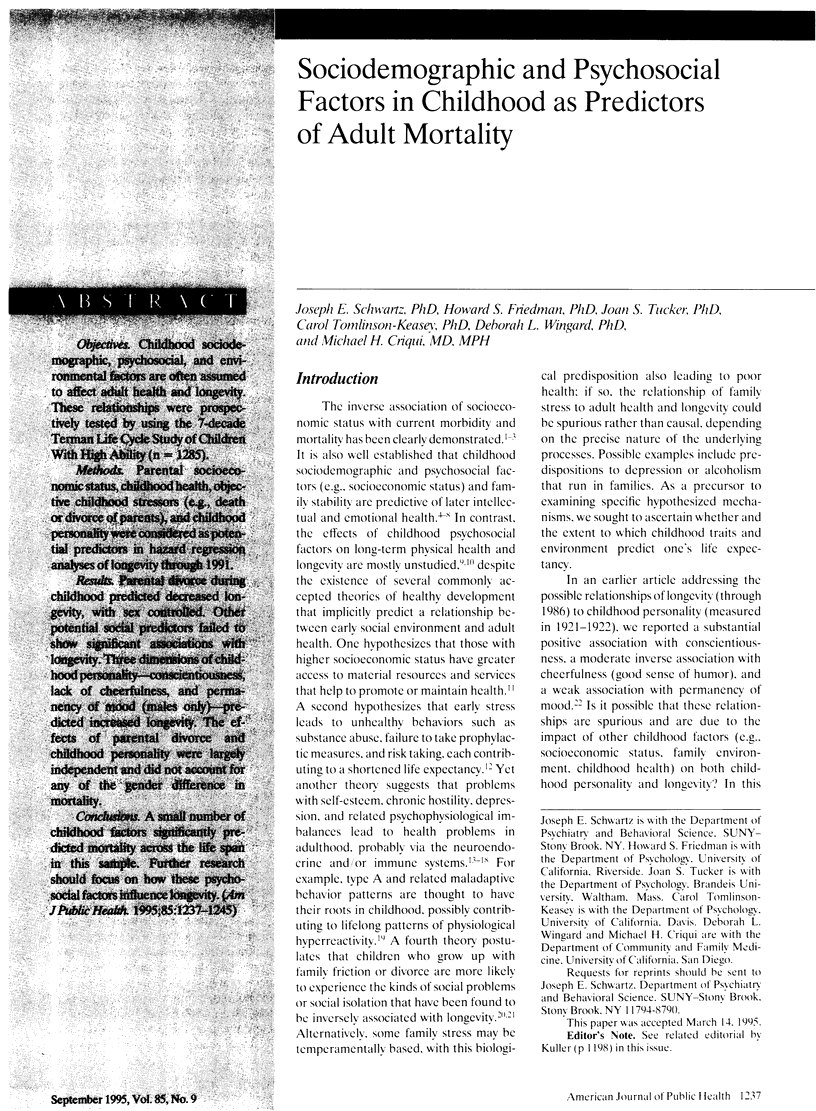
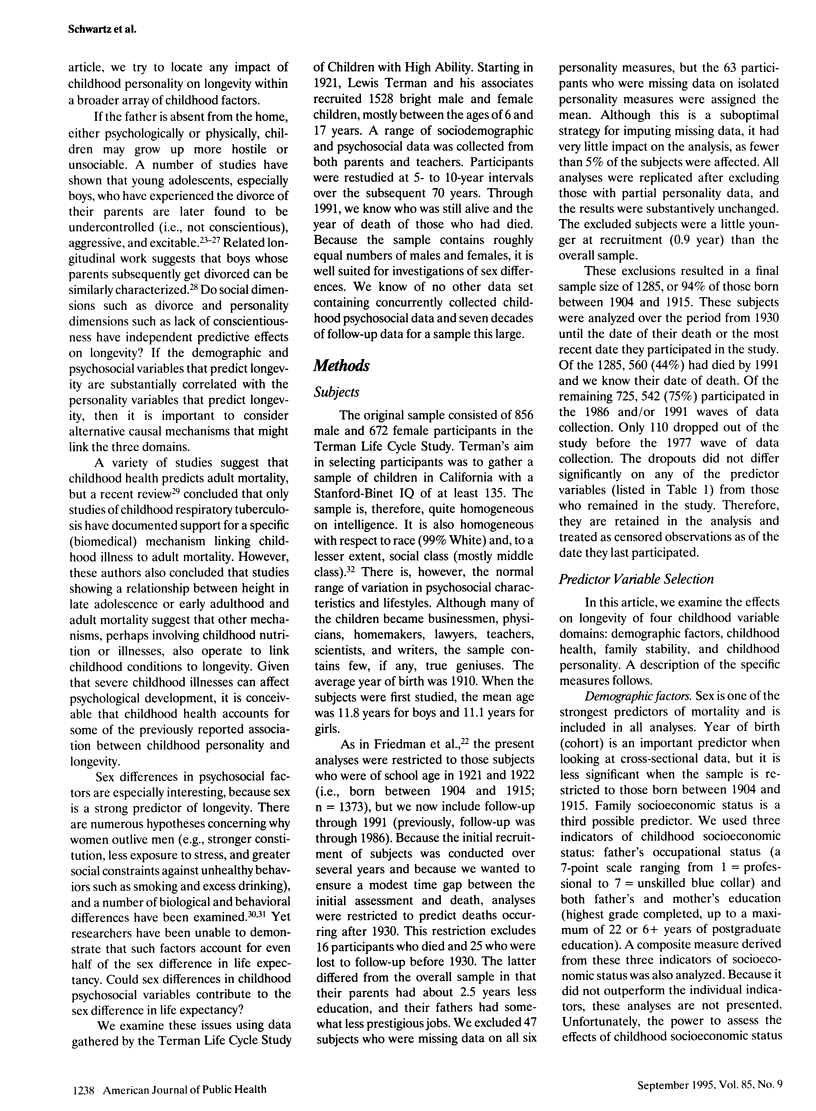
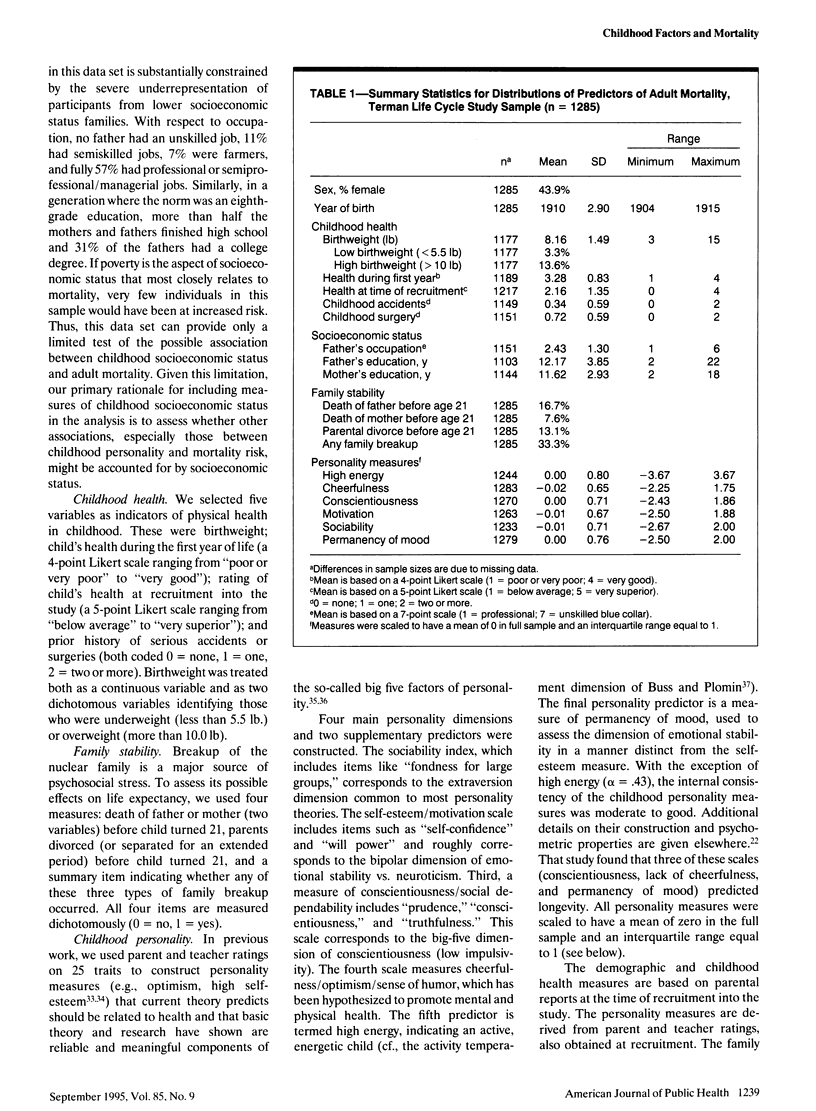
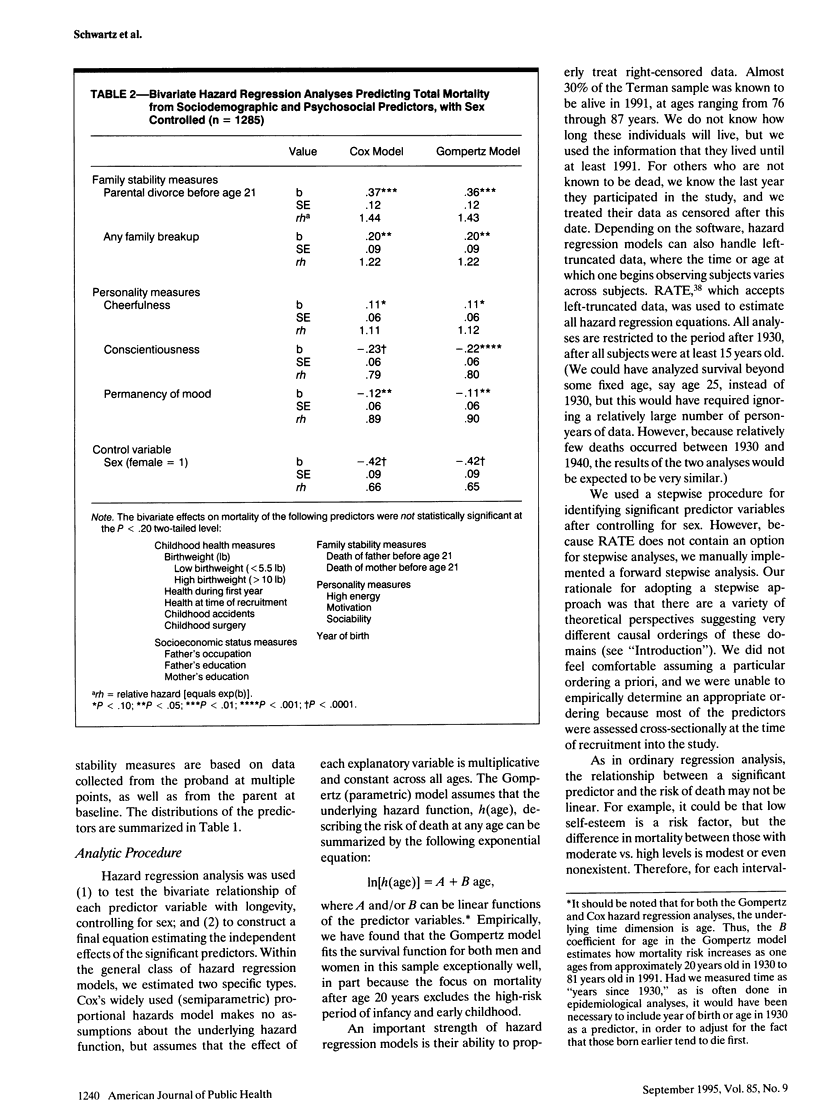
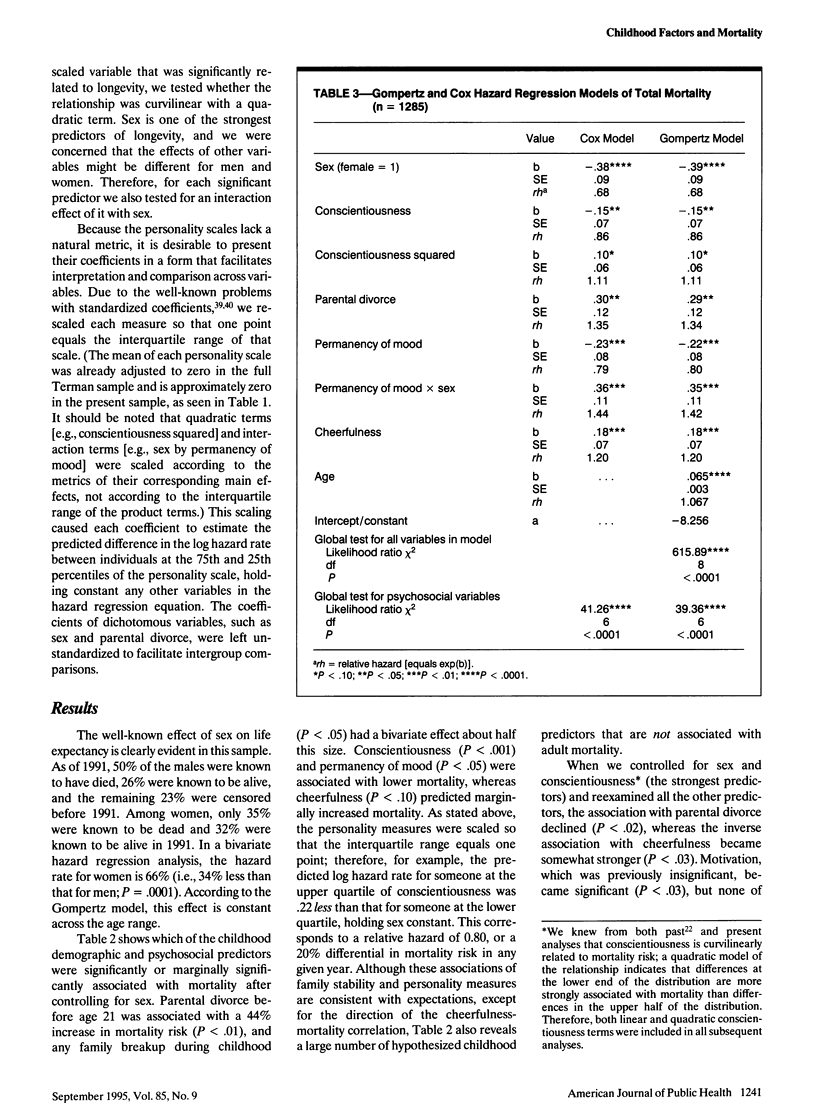
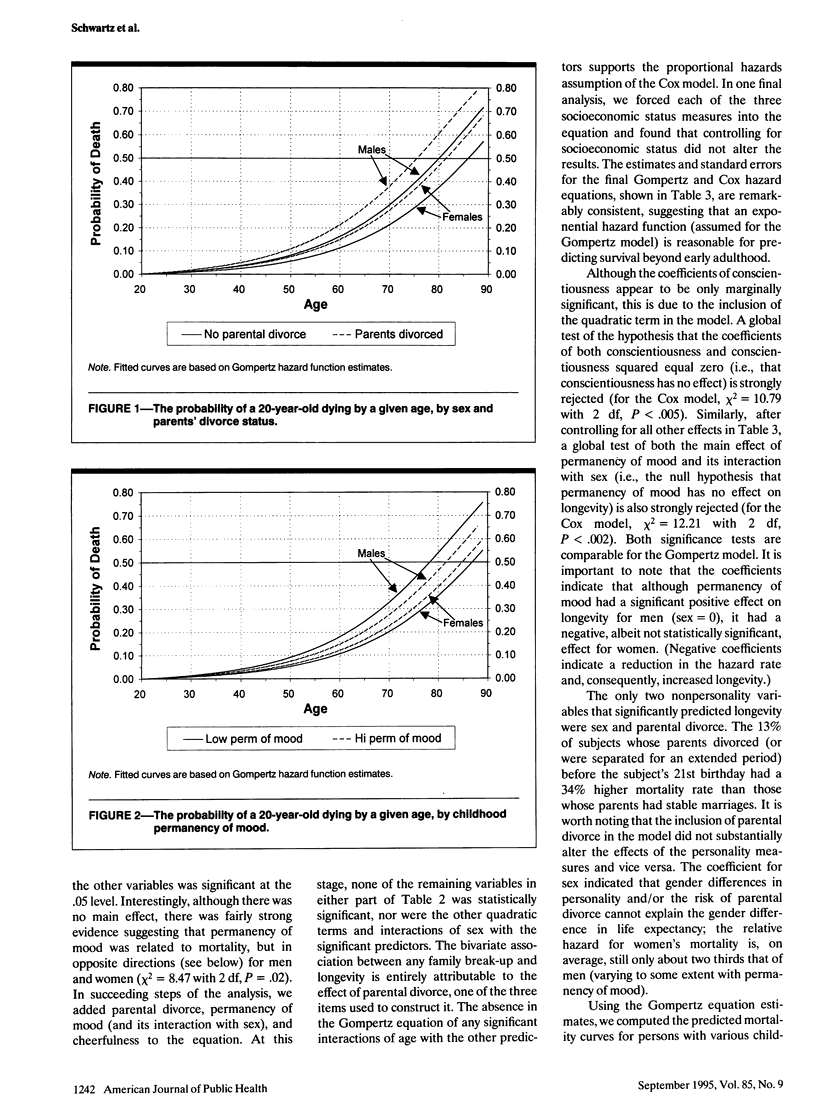
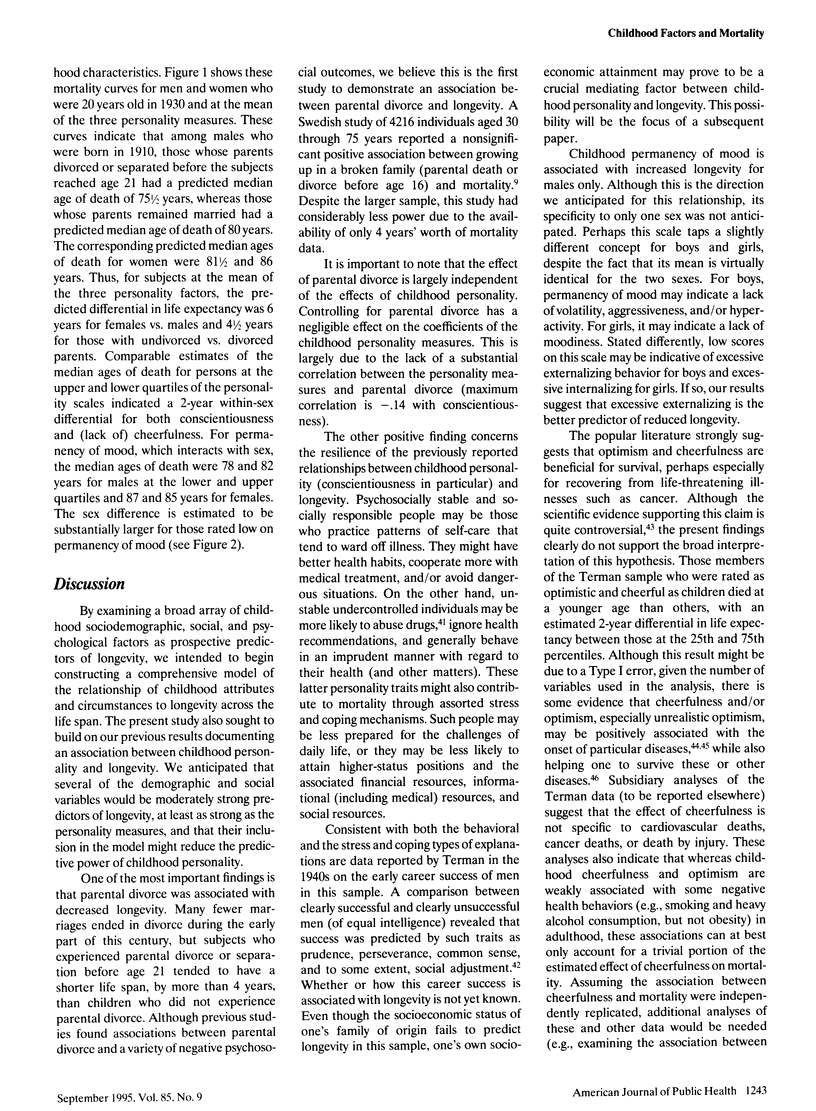
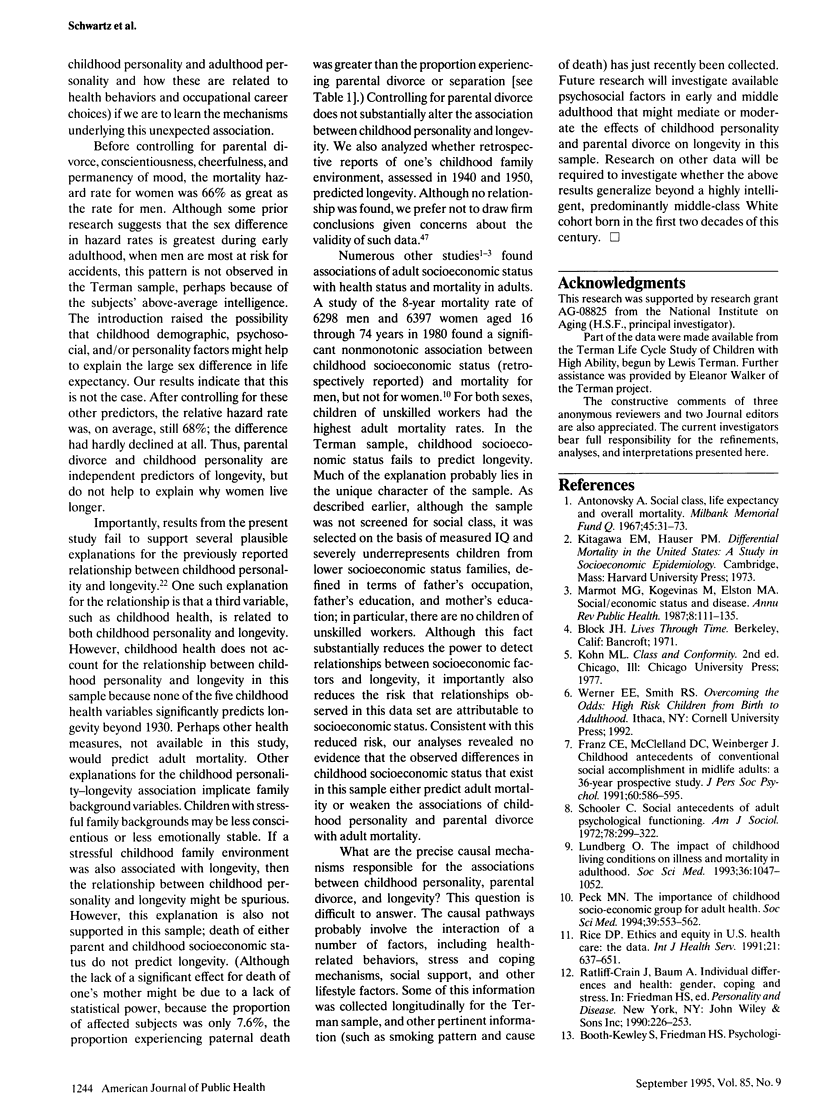
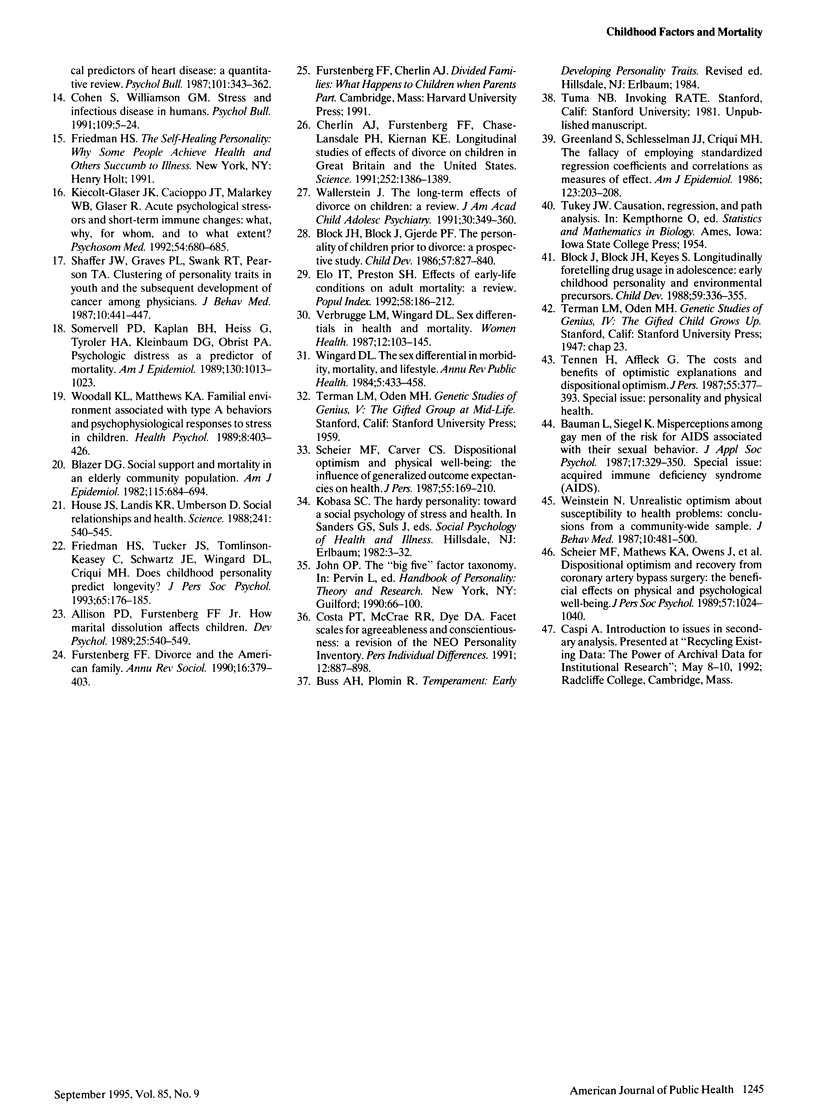
Selected References
These references are in PubMed. This may not be the complete list of references from this article.
- Antonovsky A. Social class, life expectancy and overall mortality. Milbank Mem Fund Q. 1967 Apr;45(2):31–73. [PubMed] [Google Scholar]
- Blazer D. G. Social support and mortality in an elderly community population. Am J Epidemiol. 1982 May;115(5):684–694. doi: 10.1093/oxfordjournals.aje.a113351. [DOI] [PubMed] [Google Scholar]
- Block J. H., Block J., Gjerde P. F. The personality of children prior to divorce: a prospective study. Child Dev. 1986 Aug;57(4):827–840. doi: 10.1111/j.1467-8624.1986.tb00249.x. [DOI] [PubMed] [Google Scholar]
- Block J., Block J. H., Keyes S. Longitudinally foretelling drug usage in adolescence: early childhood personality and environmental precursors. Child Dev. 1988 Apr;59(2):336–355. doi: 10.1111/j.1467-8624.1988.tb01470.x. [DOI] [PubMed] [Google Scholar]
- Cherlin A. J., Furstenberg F. F., Jr, Chase-Lansdale L., Kiernan K. E., Robins P. K., Morrison D. R., Teitler J. O. Longitudinal studies of effects of divorce on children in Great Britain and the United States. Science. 1991 Jun 7;252(5011):1386–1389. doi: 10.1126/science.2047851. [DOI] [PubMed] [Google Scholar]
- Cohen S., Williamson G. M. Stress and infectious disease in humans. Psychol Bull. 1991 Jan;109(1):5–24. doi: 10.1037/0033-2909.109.1.5. [DOI] [PubMed] [Google Scholar]
- Elo I. T., Preston S. H. Effects of early-life conditions on adult mortality: a review. Popul Index. 1992 Summer;58(2):186–212. [PubMed] [Google Scholar]
- Friedman H. S., Tucker J. S., Tomlinson-Keasey C., Schwartz J. E., Wingard D. L., Criqui M. H. Does childhood personality predict longevity? J Pers Soc Psychol. 1993 Jul;65(1):176–185. doi: 10.1037//0022-3514.65.1.176. [DOI] [PubMed] [Google Scholar]
- Greenland S., Schlesselman J. J., Criqui M. H. The fallacy of employing standardized regression coefficients and correlations as measures of effect. Am J Epidemiol. 1986 Feb;123(2):203–208. doi: 10.1093/oxfordjournals.aje.a114229. [DOI] [PubMed] [Google Scholar]
- House J. S., Landis K. R., Umberson D. Social relationships and health. Science. 1988 Jul 29;241(4865):540–545. doi: 10.1126/science.3399889. [DOI] [PubMed] [Google Scholar]
- Kiecolt-Glaser J. K., Cacioppo J. T., Malarkey W. B., Glaser R. Acute psychological stressors and short-term immune changes: what, why, for whom, and to what extent? Psychosom Med. 1992 Nov-Dec;54(6):680–685. doi: 10.1097/00006842-199211000-00008. [DOI] [PubMed] [Google Scholar]
- Lundberg O. The impact of childhood living conditions on illness and mortality in adulthood. Soc Sci Med. 1993 Apr;36(8):1047–1052. doi: 10.1016/0277-9536(93)90122-k. [DOI] [PubMed] [Google Scholar]
- Marmot M. G., Kogevinas M., Elston M. A. Social/economic status and disease. Annu Rev Public Health. 1987;8:111–135. doi: 10.1146/annurev.pu.08.050187.000551. [DOI] [PubMed] [Google Scholar]
- Peck M. N. The importance of childhood socio-economic group for adult health. Soc Sci Med. 1994 Aug;39(4):553–562. doi: 10.1016/0277-9536(94)90098-1. [DOI] [PubMed] [Google Scholar]
- Rice D. P. Ethics and equity in U.S. health care: the data. Int J Health Serv. 1991;21(4):637–651. doi: 10.2190/N70D-H1U1-TFYY-7PVB. [DOI] [PubMed] [Google Scholar]
- Scheier M. F., Carver C. S. Dispositional optimism and physical well-being: the influence of generalized outcome expectancies on health. J Pers. 1987 Jun;55(2):169–210. doi: 10.1111/j.1467-6494.1987.tb00434.x. [DOI] [PubMed] [Google Scholar]
- Scheier M. F., Matthews K. A., Owens J. F., Magovern G. J., Sr, Lefebvre R. C., Abbott R. A., Carver C. S. Dispositional optimism and recovery from coronary artery bypass surgery: the beneficial effects on physical and psychological well-being. J Pers Soc Psychol. 1989 Dec;57(6):1024–1040. doi: 10.1037//0022-3514.57.6.1024. [DOI] [PubMed] [Google Scholar]
- Schooler C. Social antecedents of adult psychological functioning. AJS. 1972 Sep;78(2):299–322. doi: 10.1086/225326. [DOI] [PubMed] [Google Scholar]
- Shaffer J. W., Graves P. L., Swank R. T., Pearson T. A. Clustering of personality traits in youth and the subsequent development of cancer among physicians. J Behav Med. 1987 Oct;10(5):441–447. doi: 10.1007/BF00846143. [DOI] [PubMed] [Google Scholar]
- Somervell P. D., Kaplan B. H., Heiss G., Tyroler H. A., Kleinbaum D. G., Obrist P. A. Psychologic distress as a predictor of mortality. Am J Epidemiol. 1989 Nov;130(5):1013–1023. doi: 10.1093/oxfordjournals.aje.a115402. [DOI] [PubMed] [Google Scholar]
- Tennen H., Affleck G. The costs and benefits of optimistic explanations and dispositional optimism. J Pers. 1987 Jun;55(2):376–393. doi: 10.1111/j.1467-6494.1987.tb00443.x. [DOI] [PubMed] [Google Scholar]
- Verbrugge L. M., Wingard D. L. Sex differentials in health and mortality. Women Health. 1987;12(2):103–145. doi: 10.1300/J013v12n02_07. [DOI] [PubMed] [Google Scholar]
- Wallerstein J. S. The long-term effects of divorce on children: a review. J Am Acad Child Adolesc Psychiatry. 1991 May;30(3):349–360. doi: 10.1097/00004583-199105000-00001. [DOI] [PubMed] [Google Scholar]
- Weinstein N. D. Unrealistic optimism about susceptibility to health problems: conclusions from a community-wide sample. J Behav Med. 1987 Oct;10(5):481–500. doi: 10.1007/BF00846146. [DOI] [PubMed] [Google Scholar]
- Wingard D. L. The sex differential in morbidity, mortality, and lifestyle. Annu Rev Public Health. 1984;5:433–458. doi: 10.1146/annurev.pu.05.050184.002245. [DOI] [PubMed] [Google Scholar]
- Woodall K. L., Matthews K. A. Familial environment associated with type A behaviors and psychophysiological responses to stress in children. Health Psychol. 1989;8(4):403–426. doi: 10.1037//0278-6133.8.4.403. [DOI] [PubMed] [Google Scholar]


